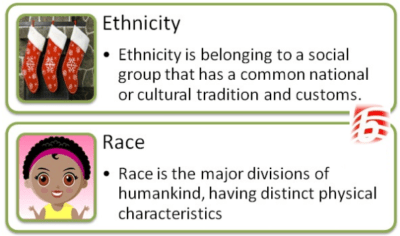The key distinction between race and ethnicity lies in the fact that race is associated with the biological differences among humans, while ethnicity is connected to the cultural and traditional differences among humans. As such, race is a single unit, whereas a person can have multiple ethnic affiliations.
Key Takeaways
- Race refers to the biological variations among humans, while ethnicity refers to cultural and traditional variations.
- A person can belong to only one race, but may have multiple ethnic connections.
- Race is determined by morphological features, while ethnicity is determined by cultural aspects of communities.
What is Race?
Race indicates the heritage to which a person belongs or their biological connection. It is a single unit structure related to the biological variations among humans and does not involve location or education. A person’s race cannot be changed and is essentially a biological subspecies. A race signifies a population with anatomical similarities among its members. However, race and ethnicity are often erroneously used interchangeably. Racial classification is associated with morphological features such as skin color, facial structure, and other biological aspects. Race is unitary in nature and is socially imposed.
What is Ethnicity?
Ethnicity involves belonging to a social group with a common national or cultural identity. It is defined by the Oxford dictionary as “The fact or state of belonging to a social group that has a common national or cultural tradition.” Ethnicity indicates where a person is from and the traditions and customs of their region. It encompasses the culture of people in a specific geographic region, including their language, heritage, religion, and customs. To be part of an ethnic group is to conform to some or all of these practices. While it was once easier to determine one’s ethnicity, it has become increasingly difficult to do so based on one’s features alone. Unlike race, a person can change their ethnicity, resulting in numerous ethnic groups worldwide. Skin color is associated with race, not ethnicity. Ethnicity is not unitary in character and is not socially imposed. There can be instances where race and ethnicity overlap, such as an African-French person who may consider themselves a member of the African or European race but not identify with the ethnicity if they do not engage in any of their ancestors’ practices or customs. Therefore, one can change their ethnicity but not their race.
What is the Difference Between Race and Ethnicity?
Race refers to a single unit structure related to the biological variations among humans, while ethnicity refers to a social group that has a common national or cultural tradition. A race is a biological subspecies of humans, while ethnicity is a cultural and traditional subgroup of humans. Race is unitary in character, while ethnicity is not. Race is determined by morphological features, while ethnicity is determined by the cultural aspects of communities.
Summary – Race vs Ethnicity
Race and ethnicity have been factors that create problems in the past and continue to do so today; therefore, it is essential to identify the difference between race and ethnicity. The difference between race and ethnicity is that race is related to the biological variations among humans, while ethnicity is related to the cultural and traditional variations among humans.
